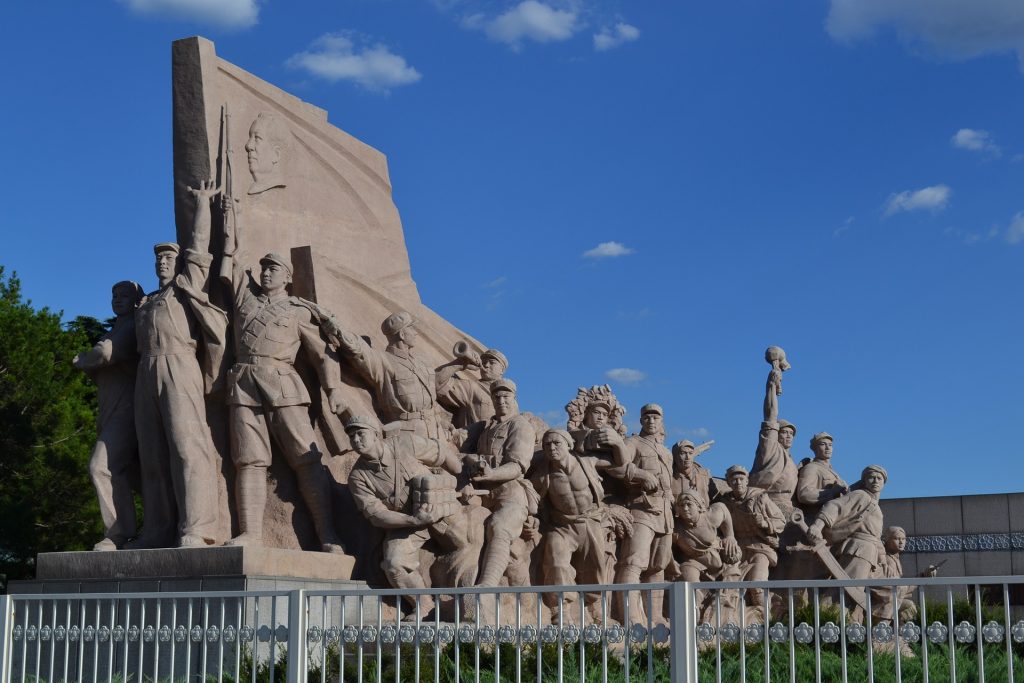
Was the passing of an “historical resolution” an historical moment for Chinese politics?
Concluding on November 10th, the Sixth Plenary Session of the 19th Central Committee of the Chinese Communist Party (CCP) was billed as yet another occasion for Xi Jinping to stamp his authority over not just the party but also China itself. Did the passing of the Resolution on Major Achievements and Historical Experience of the CPC’s 100 Years of Endeavors do just that? Only twice in the CCP’s history has it enacted so-called historical resolutions, under Mao Zedong and Deng Xiaoping in 1945 and 1981, respectively. “CEIAS Considers” asked regional experts what were the main takeaways from the plenum and was it as significant as some analysts have portrayed?
 Klára Dubravčíková
Klára Dubravčíková
Research Fellow at CEIAS
Although a rare resolution has been approved at this meeting, which was passed only twice before in 1945 and 1981 under Mao Zedong and Deng Xiaoping respectively, it has not entailed anything overwhelmingly surprising that we had not seen coming in the previous years.
The Resolution of the Central Committee of the Chinese Communist Party on the Major Achievements and Historical Experiences of the Party’s Hundred-Year Struggle is, of course, very important, given its rarity and purpose. In comparison with the previous two, this year’s resolution is not tackling any significant historical and sensitive problem, however. Instead, it is revolving around the history of the Party, its experience, and major achievements, approving the “correct orientation” of the CCP when it comes to governing the country, and thus trying to further secure its legitimacy. This time it is with Xi Jinping in its centre. It is clear that Xi has been positioned as the only figure who is capable of leading China over a long period of time and of achieving the predetermined goals and ambitions, including realizing “great rejuvenation of the Chinese nation”.
The plenum can thus be said to be an additional sign of the preservation and enhancement of Xi Jinping’s power within the system as well as a tool for galvanizing the CCP members and the Chinese people to support the path that Xi Jinping has chosen for the country and to support his leadership. The emphasis on the uneasy historical experience of China and on the official narratives can be interpreted as a simple form of propaganda, but in fact, it is extremely important for the leadership to connect the ordinary people with the Party and keep boosting the nationalistic attitudes in the society in this way, as they have been one of the supporting pillars of the regime.
Even though the resolution indicates no crucial changes in China’s policies, its implications are important to be aware of – it serves as an additional impetus behind the new and re-emerging concepts that we have observed over the past few years, be it the new development pattern stressing the domestic market as the “mainstay”, the “common prosperity” campaign focusing on equality, or the concept of “great changes unseen in a century” that leads to the adjustments in China’s grand strategy. In other words, in the so-called new era that the CCP claims is right now, we can expect the regime to continue with its ongoing campaigns closely overseen by Xi as the strongest figure. The continuous tightening of the leader’s grip, as well as the efforts to boost patriotism and build up China’s strength, restore its glory and status on the world stage, and reform the global governance system, are unlikely to fade away.
 Matej Šimalčík
Matej Šimalčík
Executive Director of CEIAS
The long-awaited Sixth Plenum of the 19th Central Committee of the CCP solidified the Xi Jinping Era as the next phase in the party’s history. As a result, Xi Jinping’s position is significantly emboldened, putting him in the same position as Mao Zedong and Deng Xiaoping, while surpassing both Hu Jintao and Jiang Zemin.
This shows that Xi managed to suppress most of the internal opposition to his rule within the Party, a process that commenced already in 2013 and saw purging of Xi’s numerous competitors. This is a significant development prior to the upcoming CCP Congress in 2022, which under normal circumstances will have seen the appointment of Xi’s successor. After the Sixth Plenum, a power transition in China seems implausible. Lets not forget though that for the past almost 2 years, signals were appearing that Xi is facing rising dissent among his fellow Party comrades, which even contributed to Xi not leaving the country since his January 2020 trip to Myanmar.
This development of course has ramifications for Chinese foreign policy. Having dealt with power centralization within the Party, Xi will be now able to take bolder positions in pursuing foreign policy goals, especially those related to the CCP “core interests”. Two issues in particular stand out – continued socioeconomic development and dealing with Taiwan.
The Communique published after the Sixth Plenum stresses the need to “deepen reform and opening up across the board, promote common prosperity for all, and build up our country’s strength in science and technology.” This suggests we will continue to see two seemingly contradictory developments – continuing internationalization of the Chinese economy with simultaneous tightening of the regulatory screws.
On Taiwan, the CPP will “firmly oppose separatist activities seeking ‘Taiwan independence’.” Provided that no fundamental shift in Taiwanese politics occurs (which currently seems unlikely), pressure in the Taiwan Strait will continue to build up. Especially when the Taiwan issue is repeatedly used by the CCP as a source of its domestic legitimacy. Expect ongoing incursions of PLA into air defense identification zone. This will naturally also increase friction with the US, as Taiwan is one of the key contentious issues of the US-China relationship, which the recent virtual Biden-Xi meeting suggests as well.
 Aleš Karmazin
Aleš Karmazin
Assistant Professor at the Department of Asian Studies, Metropolitan University Prague; and Editor-in-Chief of the Central European Journal of International and Security Studies
The sixth plenum of the Central Committee of the Communist Party of China that took place this November was a very significant one, although sixth plenums of particular Central Committees in the history of the Party do not tend to be particularly important. The adoption of a resolution on Chinese history is what makes this plenum exceptional. Such resolutions are as rare as they are important, and there were only two such resolutions before this one. They provide an official interpretation of history. While the previous two resolutions criticized preceding events – including the cultural revolution in the resolution issued under the supervision of Deng Xiaoping –, this one is a positive appraisal of China’s and the Party’s political direction. It emphasizes Xi Jinping’s ideological and practical contribution. Xi Jinping’s thought as an ideological innovation has already been inscribed in Chinese school curricula and institutionalized in other party-state documents, but this resolution further underscores the historical importance of Xi Jinping thought as on par with Mao and Deng.
This sixth plenum was chosen for adopting such a resolution as the Party is celebrating its 100th anniversary this year, and China is getting ready for the upcoming Olympic games. Moreover, Xi Jinping’s rule seemed to be destabilized for a (rather brief) period of time by Covid-19 and has been undergoing a challenge stemming from the Sino-American confrontation. Under Trump, US foreign policy was openly hostile towards China. It was a new situation that took Chinese diplomacy by surprise. However, the positive tone of this resolution suggests that we shouldn’t expect any fundamental turn in Chinese politics or foreign policy.
The resolution and the plenum certainly give Xi space to proceed further with his China Dream and national rejuvenation programme. As pointed out by many, they also indicate that he will continue at the helm of the Party for a third term, which was not possible until recently. The decision to adopt the resolution can also be read as a preventive action against any potential challenger who might want to aspire to leading the Party (a new General Secretary will be chosen next year). The resolution also increases Xi Jinping’s legitimacy to undertake historic actions like reunification with Taiwan. While it is still not very likely that China would risk open military conflict with the US, Xi Jinping’s authority to make such steps strengthened after the plenum.








